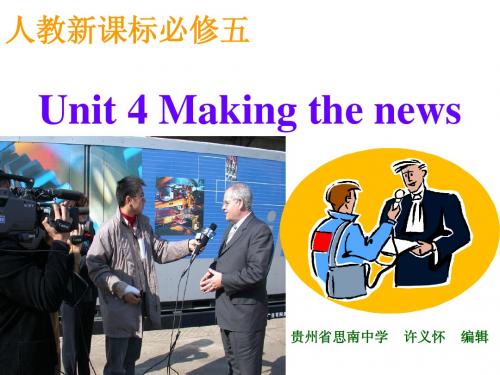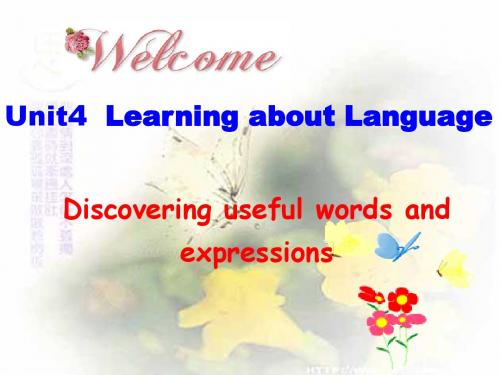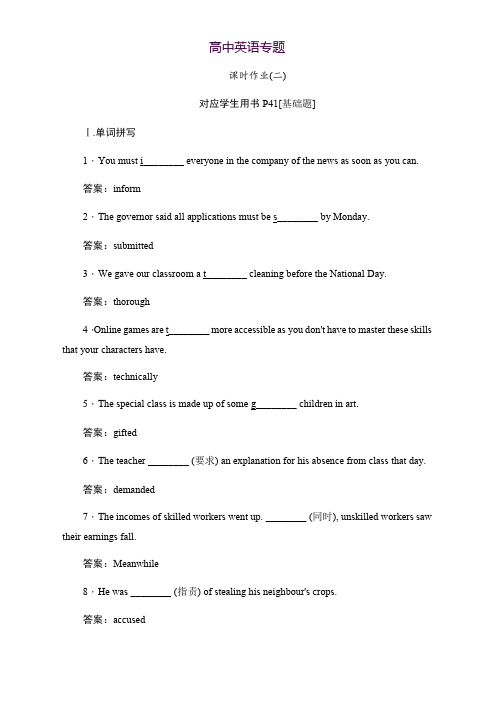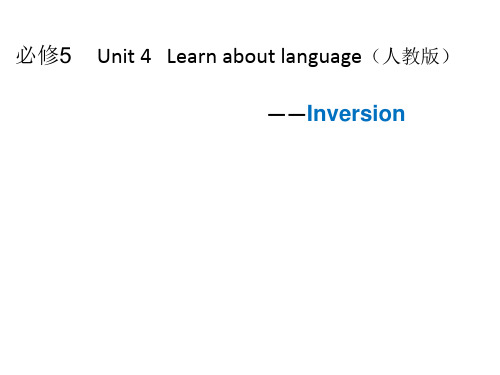2020人教版英语必修五 Unit 4 Section 2 Learning about Language
- 格式:doc
- 大小:539.40 KB
- 文档页数:5





课时作业(二)对应学生用书P41[基础题]Ⅰ.单词拼写1.You must i________ everyone in the company of the news as soon as you can.答案:inform2.The governor said all applications must be s________ by Monday.答案:submitted3.We gave our classroom a t________ cleaning before the National Day.答案:thorough4.Online games are t________ more accessible as you don't have to master these skills that your characters have.答案:technically5.The special class is made up of some g________ children in art.答案:gifted6.The teacher ________ (要求) an explanation for his absence from class that day.答案:demanded7.The incomes of skilled workers went up. ________ (同时), unskilled workers saw their earnings fall.答案:Meanwhile8.He was ________ (指责) of stealing his neighbour's crops.答案:accused9.Having been instructed to drive out of town, I began to ________ (获得) confidence.答案:acquire10.A good dictionary will ________ (帮助) you in understanding English.答案:assistⅡ.选词填空so as to; accuse ... of ... ; have a nose for; depend on;inform ... of ... ; concentrate on; be eager to; assist ... with ... ; in case of; in the meanwhile1.Tony ________ his teacher ________ the experiment yesterday.答案:assisted; with2.Please ________ us ________ any change of address as soon as possible.答案:inform; of3.As a journalist, Tom has always ________ a good story, so he does well in his work.答案:had a nose for4.[2017·浙江高考]How much sleep you need ________ a lot ________ your age.答案:depends; on5.He raised his voice ________ make himself heard.答案:so as to6.He ________ taking photographs and didn't notice me.答案:concentrated on7.They haven't been to school before. They ________ learn.答案:are eager to8.One day his landlord ________ him ________ committing a crime.答案:accused; of9.They will arrive in ten minutes. ________,we will have some coffee.答案:In the meanwhile10.The wall was built along the river ________ floods.答案:in case ofⅢ.单句语法填空1.Whether we can go to the picnic depends ________ the weather.答案:on句意:我们能否去野餐取决于天气。

Unit 4 Making the News(一)教材分析:本单元的中心话题是“新闻”,主要内容涉及新闻工作者要具备的素质和新闻采访的基本程序。
语言机能和语言知识主要围绕“新闻”这一话题展开。
热身(Warming-up)通过讨论引出“中国日报社(China Daily)”工作人员的类别和职责。
读前部分首先通过一个调查问卷引导学生了解一个优秀的记者应该具备的素质;然后引导学生讨论他们“第一次”的经历和感;最后通过一个“假设”为下一部分的学习做好准备。
阅读部分通过Zhou Yang,一名China Daily 的新员工和他的上司Hu Xin, 一名资深记者的谈话引导学生了解新闻工作者的基本素质,新闻采访的基本程序以及采访时应该注意的要点等。
理解部分设计四个活动加深学生对阅读部分的理解。
四个活动涉及从文章中获取所需信息,对阅读文章进行分段,以及通过形容词归类引导学生思考一个优秀的新闻文字记者和摄影记者应该具备的素质。
“语言学习”部分归纳和运用本单元一些重要的词汇和语法---倒装句。
语言的运用部分涵盖了听、说、读、写四项基本技能,首先通过阅读一文介绍新闻写作的步骤和见报前的有程序,并讨论文中这位“影星”可能说了什么谎,在阅读和讨论的基础上写出一条有关某影星的独家新闻,然后要求学生听一段对姚明的采访录音,做听力练习;最后要求学生通过双人对话复习和巩固有关交际功能的“约会”用语。
(二)教学目标1.语言知识2.语言技能3.学习策略4.教学的重点和难点(1)重点1)了解新闻工作者的基本素质,新闻采访的基本程序以及采访时应该注意的要点等2)学会约会3)语法项目---倒装句4)了解新闻写作的步骤和见报前的有程序5)让学生初步学会运用所学的新闻报导的知识进行新闻文章写作(2)难点1)让学生归纳出新闻工作者的基本素质2)让学生灵活运用功能用语进行约会场景交流3)让学生初步学会写新闻报道文章(三)教学安排对课本内容进行优化组合,可将本单元分成6个课时Period 1 ReadingⅠ. Teaching aims:1. Target languageoccupation, do research, on one’s own, cover, concentrate on, acquire, accuse…of, so as to, scoop1)Not till you are more experienced!2)You’ll find your colleagues very eager to assist you and if you are interested in photography,it may be possible for you to concentrate on that later on.3)Not o nly am I interested in photography, but I took a course at university, so it’s actually ofspecial interest to me.4)Only if you ask many questions will you acquire all the information you need to know.5)We say a good reporter must have a “nose” for a story.6)This is a trick of the trade.7)Have you ever had a case where somebody accused your reporters of getting the wrongend of the stick?8)Perhaps I too will get a scoop!2. Ability goal1)Enable the students to talk about qualities needed to be a good reporter and howto conduct a good interview2)Train the students’ reading ability(skimming, detail reading)Ⅱ. Teaching important points:Help the students learn about the qualities need to be a good reporter, how to get an accurate story and how to protect a story form accusation.Ⅲ. Teaching difficult points:How to help the students learn about the qualities need to be a good reporter, how to get an accurate story and how to protect a story form accusation.Ⅳ. Teaching methods:Cooperative learning, task-based learning, fast-readingⅤ. Teaching aids:A computer, a blackboard, a tape-recordⅥ. Teaching procedures:StepⅠLead-in1.Greeting2.Ask Ss some questions about their future jobs.1)Have you ever considered about your future job or occupation?2)What kind of occupation would you like to take? / What’s your ideal of job infuture? Why?Step Ⅱ Warming-up1.Ask Ss to look at newspapers previously prepared and guess what kind of jobswould be needed to produce newspaper articles.2.Ask Ss to work in pairs and fill in the chart ( types of jobs, what each type of jobinvolves)Reference Chart:StepⅢ Pre-reading1.Ask the Ss work in pairs to discuss the qualities need for a newspaperreporter and evaluate which qualities they consider are the most important, and they can also make some complements. Put all the qualities on the board in a list and alongside them put two columns: one for the most important ones and one for important qualities. Ask one from each pair to give their findings on (what they consider) very important and important qualities. Put a tick for each one in the correct column. Count up the ticks and write down the three most important qualities and the three important qualities.2.Ask the Ss to work in pairs to discuss an occasion of this sort that they remembere.g. fist day at a new school, and ask them to consider why they remember it andespecially how they felt. Then choose some of them to tell their experiences.3.Discuss what all the experiences have in common and what they can do●Make themselves feel better●Make others feel betterStep Ⅳ Reading1.Fast reading. Ask the Ss to go through the whole passage as fastas they can and try to find answers to the following questions.(Shown on the blackboard)1)Could Zhou Yang go out on a story alone immediately? Why (not)?2)What mistakes must he avoid?3)How did Zhou Yang feel on his first day at work?2.Ask the Ss to pay attention to the way the questions develop in the dialogue(Explain to them that all of these questions are finding out more about the qualities and skills needed for the job)3.Ask the Ss to follow the tape and read the passage again and then do theExercise in comprehending part together. (For detail, refer to the PPT)Step Ⅴ Language pointsExplain some difficult language points as listed in the PPT. (Omitted, just refer to the correspondent PPT)Step Ⅵ Homework1. Practice reading aloud the dialogue with your partner. Pay attention to theintonation and stress.2. Read a newspaper and try to discover something to do with our topic about it.Period 2 Learning about LanguageⅠ. Teaching aims:1.Target Languageuntrained, fairly, technical, process, polish, concentrate on…; accuse …of …, approve of…, by accident, get absorbed in, defend against, break downShe does not get absorbed in…The reporter went out with…2.Ability goalsEnable the Ss to know how to use some expressions in an idiomatic way.Enable the Ss to use the words and expressions more freelyⅡ. Teaching important points:Get the Ss to practice the words and expressions more freely and correctlyⅢ. Teaching difficult points:How to enable the Ss to use the words and expressions more freely and correctlyⅣ. Teaching methods:Cooperative learning, task-based learning, explaining, discussion and practicing.Ⅴ. Teaching aids:A computer, a blackboard, a tape-recordedⅥ. Teaching procedures:StepⅠ GreetingsStepⅡ RevisionT: Yesterday we talked about the qualities needed to be a good reporter, how to get an accurate story and how to protect a story from accusation. Now I’d like you to tell me what qualities a reporter should have. (Ask a Ss to share their knowledge with others)StepⅢ Discovering useful words and expressions1.Ex1 on page 28. Give Ss directions that they should find the idiomatic expressionsused in the text to match with the expressions given in the Activity. Then check and make some necessary explanation.2.Ex2 on page 28. Ask the Ss to finish Exercise 2 and then check the answer andmake some explanation if needed.StepⅣ Using words and expressions (P63)1. First deal with Ex.1 on page 63.“What happened when the General went to war?” Students can work in pairs to have a discussion, and then ask some students to give their answers.A: The General went away to war. Meanwhile his advisers marked his progress on a map so as to be sure of knowing where he was.B: Meanwhile the gardener planted new flowers in the flowerbeds so as to be able to make a beautiful garden f or the General’s return.Meanwhile the cook learned to make some new dishes so as to be able to prepare a special banquet when the General returned.Meanwhile his wife made him some new clothes so as to be able to dress him smartly for the banquet on his return.Meanwhile his children practiced some new songs and dances so as to be able to perform for the General when he returned.2. If time permits, continue Exercises 2-4.Step V. Homework1.Review the words and expressions for this Unit.2.Preview discovering useful structures.Period 3 Grammar: InversionsⅠ. Teaching aims:1.Enable the students to use inverted sentences correctly2.Help the students learn how to use Inversions correctlyⅡ. Teaching important points:Help the students learn what Inversion is and how to use Inversions correctly Ⅲ. Teaching difficult points:How to help the students to apply the Inversions correctly in contextⅣ. Teaching methods:Inductive and deductive methods, task-based learning and cooperative learning Ⅴ. Teaching aids:A computer, a projectorⅥ. Teaching procedures:Step Ⅰ Presentation1.Ask the Ss to find out the sentences of Inversion in the Reading. First explainwhat an inversion is.“In normal word order in a sentence the subject comes before the verb. But sometimes the order of the subject and the verb is reversed, which we call Inversion.2.Ask the Ss to say the sentences, and then show the answers on the screen.Never will Zhou Yang forget his first assignment at China daily.Only when you have seen what he or she does, can you cover a story by yourself.Only if you ask many different questions will you acquire the information you need to knowStep Ⅱ Explanation and SummaryThe order of the subject and the verb is reversed after the following adverbial elements:1)Adverbial expressions of negation or near negation with no, not, never,neither, seldom, scarcely, rarely, barely and hardly, etc. The same reversal of word order takes place after negative conjunctions like neither, nor, not only…but also, no sooner… thane.g. In no case can an exception be made.Never have I seen such a stupid.Not until he loses all his money will he stop gambling.Scarcely had he entered the room when he was knocked down by astranger.Not only is he beautiful, but she is also very intelligent.I cannot attend the meeting tonight, and neither can my wife.2) Adverbial expressions with onlye.g. Only after an operation will he be able to walk again.Only one has he done such a thing.3) Adverbial expressions with soe.g. So greatly did he admire the beautiful actress he asked her to marry him.The word order is also reversed after the conjunction so.e.g. I caught a cold, and so did my wife.4) Adverbial expressions of placee.g. There stood the tallest man he had ever seen.Inside the room were a few pieces of furniture.But when the subject is a pronoun instead of a noun, the order should not be inverted.e.g. Here he comes.Off he ran.5) Other adverbials in initial positione.g. Loud and clear rang the bell.Often did we sit together without saying a word.Step Ⅳ Further Explaining全部倒装1.用于there be 句型.There are many students in the classroom2. 用于“here (there, now, then) + 不及物动词+主语的句型中,或以out, in, up, down, away等副词开头的句子里面,表示强调.●Here comes the bus.●There goes the bell.●Now comes our turn.●Out went the children.代词作主语时,主谓语序不变.Here it is.In he comes.3. 当句首状语是表示地点的介词词组时,也常引起全部倒装.South of the city lies a big steel factory.From the valley came a frightening sound.Under the tree stands a little boy.4. 表语置于句首时,倒装结构采用“表语+连系动词+主语”的结构1) 形容词+连系动词+主语Present at the meeting were Professor White, Professor Smith and manyother guests.2) 过去分词+连系动词+主语Gone are the days when they could do what they liked .4)介词+连系动词+主语Among the goods are Christmas trees, flowers, candles and toys.5. 为了保持句子结构平衡,或为了强调表语或状语,或为了使上下文结构紧凑.They arrived at a farmhouse, in front of which sat a small boy.Inside the pyramids are the burial rooms for the kings and queens and longpassages to these rooms.部分倒装1.用于疑问句.Do you speak English?2. 用于省略if 的虚拟条件句Had you reviewed your lessons, you might have passed the examination.3. 用于“形容词(或名词、动词)+as (though)”引导的让步状语从句.●Pretty as she is, she in not clever.●Try as he would, he might fail again.●Money as they had, they don’t know how to spend it.4. 用于no sooner than, hardly when 和not until的句型中No sooner had she gone out than the class began.Not until the teacher came did he finish his homework.5. 用于never, hardly, seldom, scarcely, little, atno time, not only 等否定词开头的句子里.●Never shall I do this again.●At no time can you say “ no” to the order.●Little do I dream I would see you here.6. 用于only 开头的句子(only位于句首,修饰副词、介词短语或状语从句)●Only in this way can you lean English well.●Only when he told me did I realize whattrouble he was in.7. 用于so, nor, neither 开头的句子,表示重复的内容.此句谓语应与前句谓语的时态形式一致.●He has been to Beijing. So have I.●Jack can not answer the question. Neither can I.8. 在so / such that 的结构中,若so 置于句首,则句子部分倒装●So difficult a problem is it that I can’t work it out.●Such a noble person is he that people all respect him.9.如果直接引语后注明引语是什么人所说的,主语是名词时,用倒装结构.主语是代词时,一般不用倒装结构.“Let’ go,” said the man / he said.10.用于某些祝愿的句子.May you succeed!Step Ⅴ Consolidating and Applying the ruleExercise to be shown on the PPT and one student at a time to do the exercise orally. (Multiple choices, E-C translation, using inversions)Step Ⅵ Summary and Assignment1.Make a summary of today’s task.2.Ask Ss to write a short passage, and try to use as many asinversions in the passage.Period 4 Using languageⅠ. Teaching aims:Target language:edition, department, accurate, concise, chief, employ, polish, note, chief, approve, negative, process, primary source, secondary source, present, investigateAlthough he realized…, Zhou Yang knew he must not accuse him directlyMonths of training had taught him to write with no wasted words or phrases.One of the reasons… that is that they help us to decide what is… and what is…Ability goals:1.Enable the Ss to get some basic knowledge about the writing and printingprocess of an article2.Enable the Ss know what is primary source and what is secondary source. Ⅱ. Teaching important points:Make Ss understand writing and printing process for an article and the primary and secondary sourceⅢ. Teaching difficult points:Make Ss understand writing and printing process for an article and the primary and secondary sourceⅣ. Teaching methods:Fast-reading method, task-based methodⅤ. Teaching aids:A computer, a blackboard, a recorderⅥ. Teaching procedures:StepⅠLead-in1.Greetings.2.“Nowadays with the develop ment of media, lots of information can bereceived by people all over the world soon everyday. And people can learnabout news at home and abroad by watching TV, listening to radio, surfingthe Internet, reading magazines and newspapers etc. Among these media,newspaper is one of the oldest, In China there are many kinds ofnewspapers. I believe all of you read some of them everyday. Am I right?”Using words above to lead in today’s topic and get Ss involved in their familiar media form, newspapers.StepⅡ Reading1.Ask Ss to go over the passage (Getting the “Scoop”) quickly and find thegeneral idea of the text. (Answer: It introduces the process of writing andprinting for a newspaper article.2.Scanning: Ask Ss to read the passage again and try to answer the questionsas listed on the screen.Questions:1)What is Zhou Yang’s first task? (Answer: His first task was to write hisstory)2)How many people read his article before it was ready to be processedinto film negatives? Who were they? (Answer: Before it was ready tobe processed into film negative, an editor from his department, thecopy-editor, the native speaker, the chief editor and the new desk editorread his article.)3.Then let the Ss make full use of their imagination to complete Ex2.Step Ⅲ Extensive Reading (P 65)1. Ask Ss to turn to page65 and read the passage as quickly as theycan to get the main idea of the passage. (Answer: The passage tells us what a primary source and a secondary source are and the difference between them.2. Ask Ss to read the whole text again in detail and do the True orFalse questions on blackboard.1. When we read about Jia Sixie in our textbook we are reading a primarysource.2. As we watch the news on TV, the person presenting the programme in thestudio is the secondary source.3. Photographers sometimes are both primary and secondary sources.4. Knowing the difference of primary and secondary sources can help us decidewhat is a fact and what is an opinion.5. Often facts and opinions are mixed in any report.Keys: FTFTTTipsA primary source depends on: The person who has written the news should bethere at the time.Primary sources and secondary sources are very important for finding out the truth. The closer a person is to the event they describe in time or geographically, the more likely they are to be accurate.3. Do Exercise3 to choose Ss’ understanding.The primary source is the Garlic Wars because it was written at the time. I think Plutarch Life of Julius Caesar and Shakespeare’s play about Julius Caesar will have more opinion than fact because they were written long after the events happened.Ste pⅣSummary and AssignmentToday we’ve learned writing and printing process for an aticle and what is a primary source and what is a secondary one. These are very important for your future work if you want to be a reporter. Today’s homework:1. Ask the students to interview a student of Senior Grade three and write areport about their present study and life.2. Report a thing recently happened in your neighborhood or in the local area.Period 5 Listening and SpeakingⅠ. Teaching aims:Target Language:remind … of…, appear, eyewitness, on the spot, supporter, photographShall we make an appointment?Maybe we can meet at…When do you think is convenient for you?Which day would suit you best?Where would you like to meet?I shall be busy at… and… , but I can be free at…I suggest that we meet…I may be able to see you at…That will/won’t be convenient because…I look forward to seeing you.Ability goal:1. Enable the Ss to learn how to make appointments2. Train Ss’ language skills listening & SpeakingⅡ. Teaching important points:Guide the Ss learn how to make appointments.Ⅲ. Teaching difficult points:How to guide the Ss learn to make appointmentsⅣ. Teaching methods:Listening; speaking, cooperative learningⅤ. Teaching aids:A computer, a projector and a tape recorderⅥ. Teaching procedures:StepⅠLead-inAsk a group of students to tell whom they want to interview most if they are offered a chance, and also ask them to make out the reason. Thus to lead in today’s task.T: If you were a reporter, who would you want to interview most? Why?StepⅡ ListeningTask1 Deal with the listening part on page 31.Ask Ss to go through the questions of Exercise 1&2 in Listening and Speaking on page31. Then play the tape for three times. (For the first time, ask them to listen for the main ideas and do Exercise 1, For the second time, finish Exercise 2. And for the last time, check the answers themselves.A.This is about a young man who is refused an interview with Liu May.B.This about a young man who is trying to arrange an interview with Liu Mei.C.This is about a young man who wants to ask Liu Mei about how to workabroad.1. Why does Zhou Yang want to interview Liu Ming?He wants to interview him about his decision to go to work abroad.2. What are his fans worried about?His fans worried that they will not see him in the flesh.Task2 Deal with Listening on page62 and listening task on page66.Step Ⅲ SpeakingThis task is to let the students practice making appointments.Ask Ss read instructions of Exercise 3 on page 32 and work in pairs and role-play theSample dialogue:S1: Hello. I’d like to speak to Li Feizhou. I’m the photographer ringing him to make an appointment for some photographs for “cool scene” magazine. Is it possible to meet him tomorrow?S2: Hello. Perhaps I can help. I am Li Feizhou’s secretary. I’m afraid he can only meet you tomorrow afternoon as he had a haircut in the morning. Is that OK?S1: Oh dear. I was hoping he would be free in the morning as I have another appointment then. It should only take two hours. Maybe we could meet before or after his appointment.S2: Yes. That might be possible. But he’s busy between 9:00 and 10:30 and then between 11:30 and 1:00 but he might be free for an hour between 10:30 and 11:30. S1: I don’t think that’s long enough. Could he change his other appointment to another day?S2: I don’t think so.S1: Then could he be free at 10:00? We could do the photographs and I would still be on time for my next appointment.S2: That sounds quite possible. I’ll ask him. What would he need to wear?S1: Some comfortable clothes would be best.S2: Fine. I’ll talk to him and call you again very soon. Where would i t be best to meet? S1: At the studio if that is OK with you. Thank you very much.S2: My pleasure.Step Ⅳ Listening (WB P62)The students will hear a conversation between Susan and Greg. They are asked to do the exercise according to the tape.T: Many people think that making a radio or TV interview is fun and interesting. But there can be problems. What will be problems? Listen to the tape and try to finish the exercise.Listen to the tape again and check the answers with the whole class.Students answer the questions in pairs. One asks the questions and the otherStepⅤ Listening Task (WB P66)Put students into pairs. Ask them to think of as many practical situations as they can, where being “on the spot” is very important to understanding what is happening. Discuss why an eyewitness would help in each situation.Listen to the tape for the first time. Ask students to write down the gist of the listening passage in one sentence.Go through the task and listen again and do the exercise.Check the answers.Step Ⅵ Summary and HomeworkIn this period we’ve done some listening practice and practiced how to make appointments. After class, please listen to the recording repeatedly and pay attention to the pronunciation as well as functional sentences of how to make appointments.Period 6 WritingⅠ. Teaching aims:Target languageeyewitness, opinion, information, stick to, rather than, account forAbility goalsEnable the Ss to know how to express opinions of own and justify the situations according to different opinions.Enable the Ss to grasp the main points of news-writing.Teaching important and difficult pointsJustify the different point of view and make one’s own opinions.Write the news clearly and pithily.Teaching methodDiscussion, cooperative learning, debatingTeaching aidsA projector, a computerTeaching procedures:Step I RevisionCheck the homework and take a dictation.Ask Ss how important it is to get the first source, how important the eyewitnesses are.Step II Warming upHave a debate: In a local fishing competition, a person tells you he / she has caught a fish the size of a small car. It will win him / her first prize at a local fishing competition. But an eyewitness says he / she cheated. He saw the fisherman buying it at a fish shop. Do you believe the eyewitness or the fisherman? Divided students into two groups, and tell the reasons who they support.Step III Group WorkAsk students to work in groups of four and play one of the following roles each: CCTV Newsman / woman, Fisherman, Eyewitness, Reporter of Local Evening News. Make a dialogue in four and express their own opinions.Step IV Presentation.CCTV NewmanFishermanEyewitnessReporter of Local Evening News Explain the exciting story Stick to facts rather than opinions Accept the interview with the reporter Accounts for his/ her behaviour Accept the interview with the reporter Tell him what he/ she sawPrepare interview questions for thefisherman/woman and the eyewitness;Find out truth through your ownanalysis .Ask four of the students to express their own opinions.Step V Writing TaskFill in the form on page 68. List the facts and the opinions. Write about each fact and then write about the opinion. Try to follow the example and make the news clear and pithy or concise. Also let the Ss pay attention to the followings:State the situation of the story in paragraph 1;Set out what happened clearly in Paragraphs2 and 3;State how the story ended and your opinion on what happened in Paragraph 4. Allow the students enough time to work on their writing. (If there is a lack of time, leave the task for homework)A sample version:Fish StoryToday is the city’s annual Father’s Day Fishing Competition. Mr. Thompson took part in the fishing competition. He presented a very large and rare fish as big as a small car.Mr. Thompson said, “ It was quite by accident.”“I had a bite on the line. It was this wonderful fish. So, of course, I pulled it out of the water very quickly.” He added.However, an eyewitness said he had seen Mr. Thompson earlier in the day buying fish at the fish market. He said, “I saw the fisherman go into the shop and come out with this large, rare fish.”“Then he went to the judges and they weighed his fish and told him it was the largest so far”, said the witness.Mr. Thompson finally admitted he had bought the fish and had not caught it. He apologized in public and said that he only did it so his son would be proud of him as a fisherman. So it seems that it was Mr. Thompson who was the big fish!Step VI Homework1.Finish the writing work at home.2. Review the whole unit and prepare for a test.英语学习讲义好好努力梦想终会实现21。
SectionⅡLearning about Language,UsingLanguage,Summing Up&Learning Tip课后篇巩固提升一、用方框内所给短语的适当形式填空1.In spring my family go to the forest to nature.2.When he came into the performing hall,all the fans.3.Can you pay me ?4.If you want your dream to,you should work hard.5.There are many ways to and playing games is one of them.6.It’s believed that children with a single parent at our school were .二、单句填空1.He was given ( admit) to his ideal university after getting a satisfying score in the college entrance exam.2.Generally,the rent should be paid three months advance.3.The majority of British people voted to leave the EU,while the (minor) opposed.4.Technically it is the most ( advance ) equipment ever.5.I ended my travels by meeting face to face a dinosaur,and survived the experience.st week I took a journey deep into space,to the end of the solar system,and (pull) into a black hole.三、翻译句子1.Most members of the committee were in favor of the suggestion;only a minority were against it.,只有少部分人反对。
Unit 4 Section ⅡⅠ.单句语法填空导学号 403102661.Some people envy others' success,but seldom __do__ they think of the misery they have suffered.解析:句意:一些人嫉妒别人的成功,但很少考虑他们经历的痛苦。
seldom是否定副词,位于句首,句子需用部分倒装;再根据句中的envy可知用一般现在时,故填do。
2.This tradition of setting up a Christmas tree soon spread to many American homes,__so__did the practice of giving people presents.解析:句意:竖立一棵圣诞树的传统不久就传播到了许多美国的家庭,送礼物给人们的惯例也传开了。
空格后是倒装句,有此用法的是so。
3.No sooner had the super star__appeared__(appear) on the stage than his crazy fans burst into cheers and kept calling his name.解析:句意:那位超级巨星一出现在舞台上,他的疯狂的粉丝们就欢呼起来,不停地喊他的名字。
no sooner位于句首,句子需用部分倒装;再根据在句型no sooner...than...“一……就……”结构中,主句需用过去完成时,故填appeared。
4.Not only did she promise to provide the homeless with help,but she also__said__(say) her organization would collect money for the kids with AIDS.解析:句意:她不仅承诺为无家可归的人提供帮助,还说她的组织将为患艾滋病的孩子募捐。
not only 位于句首,后接句子时,主句需用部分倒装;再根据did she promise可知,应用said。
5.Not until Miss Zhou talked with other teachers__did__(do)she know that Tony was a child with learning disabilities.解析:句意:直到周老师与其他的老师交流了以后她才知道托尼是一个有学习障碍的孩子。
not until 位于句首,主句需用部分倒装;再根据talked可知,应用一般过去时。
故填did。
Ⅱ.选词填空导学号 40310267They tried to__defend__themselves__against__the enemy with all their might.2.The owner of the pub was__accused_of__watering the beer.3.The theory is based on__a_series_of__wrong assumptions.4.The test questions are kept secret__so_as_to__prevent cheating.5.We__get_absorbed_in__the discussion for several hours every time we meet.6.There were so many wounded people that the blood was__in__great__demand__.7.__Fill_in__your address at the bottom of the application form.8.His decision will__depend_on__how much money we can raise.9.I don't know whether they did it __by_accident__ or by design.10.Some people __refer__ all the troubles__to__bad luck instead of lack of ability.Ⅲ.补全句子导学号 403102681.It's nice.Never before__have_I_had__(我以前喝过) such a special drink!2.The headmaster will not permit the change in the course,__nor_will_he__(他也不会) even give it a thought.3.So much__did_they_eat__(他们吃得) that they could not move for the next hour.4.Not until he retired from teaching three years ago__did_he_consider__(他才考虑) having a holiday abroad.5.We laugh at jokes,but seldom__do_we_think__(我们认为)about how they work.6.—Is everyone here?—Not yet...Look,__there_come__(那里来了)the rest of our guests!7.At the meeting place of the Yangtze River and the Jialing River__lies_Chongqing__(重庆坐落),one of the ten largest cities in China.8.Only if people of all the countries are unfited__can_we_solve__(我们才能解决) the existing problems in the world.9.No sooner__had_I_sat_down__(我刚坐下)than the telephone rang.10.__Busy_as_he_was__(虽然很忙),he spared some time to accompany me.Ⅳ.阅读理解导学号 40310269The managing editor is usually the person in charge of the day-to-day editorial process of a newspaper.He or she makes sure that the newspaper comes out on time each day and that costs are kept within a budget(预算).He or she is usually responsible for hiring and firing news room staff,and serves as the spokesperson for the newspaper.The managing editor may also be involved in story,photo and graphics (图形) selection,assignments,laying out pages,and editing copy and writing headlines.The news editor is in charge of the news pages of the newspaper.He or she makes decisions on which stories are used and which are not.The news editor and his or her assistants also layout pages of the paper.The copy editor edits wire and local stories and writes headlines.The copy editor is often the last person to see a story before it actually appears in print.The city editor makes sure that the news in the city is covered and that as many local stories as possible get into each edition.The city editor supervises the local general assignment,beat and speciality reporters.The city editor supervises reporters who cover communities and areas outside the city but still within the circulation(发行) area of the newspaper.The national editor supervises reporters in bureaus in cities outside the circulation area of the newspaper.Most newspapers rely on the wire services for national news,but some have correspondents who work in other cities and report to the national editor.1.If you want to apply for a job in a newspaper news room,you are likely to be interviewed by__D__.A.the news editorB.the national editorC.the city editorD.the managing editor解析:由第一段的第一句“The managing editor is usually the person in charge of the day-to-day editorial process of a newspaper.”和第三句“He or she is usually responsible for hiring and firing news room staff.”可知。